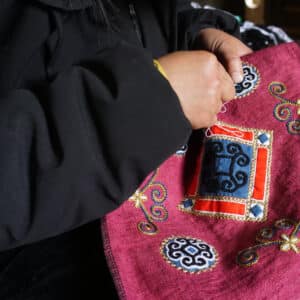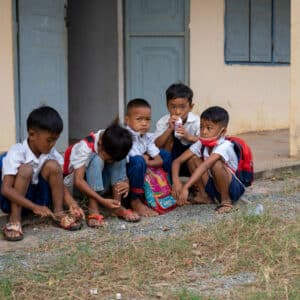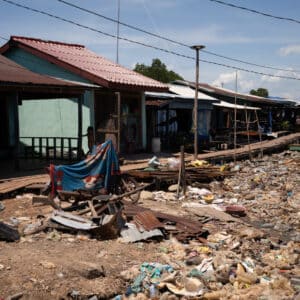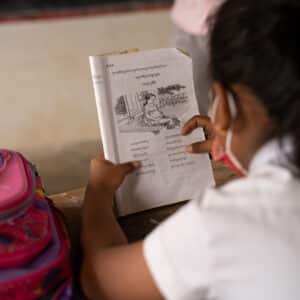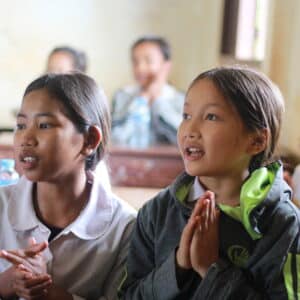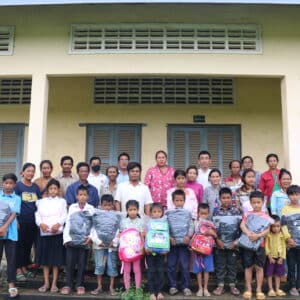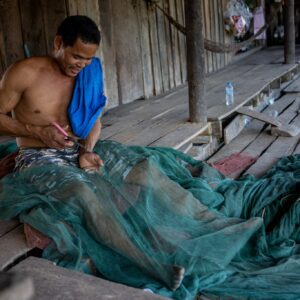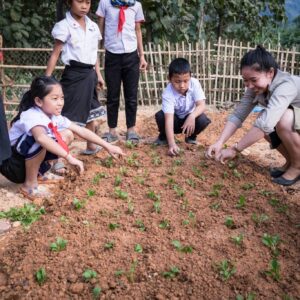For Aide et Action, our 40 years of working with marginalized children around the world have taught us that good health and quality education go hand in hand: without access to education, health cannot be achieved and without good health, education cannot be attained.
Despite progress in recent years, Laos still has the highest under-five child mortality rate in Southeast Asia (46 per 1,000 live births), according to the Lao Social Indicator Survey (LSIS-II). Laos also has some of the highest rates of child stunting in the region (33% compared to Asia regional average of 21.8%) with one in three children under five reported to have stunted growth due to malnutrition and in turn, a reduced capacity to learn in school and grow to their fullest potential.
To address these alarming issues, we’ve adapted a multi-faceted approach to ensure that children in rural communities, home largely to economically disadvantaged ethnic minority groups, have improved access to education and education. We’re achieving this by supporting schools to upgrade water, sanitation and hygiene infrastructure such as toilets and sinks and a community-based nutrition project.
Water, sanitation and hygiene
In the small, rural village of NongPor, Vientiane province, local primary school principal Mr. Tu Suksith attests that improved water, sanitation, and hygiene infrastructure has led to a change of behavior among his young students. Aide et Action in partnership with Taiwan Fund for Children and Families supported NongPor Primary School to build a new, modern toilet, an upgrade from its only other toilet which was made of wood and caused many problems.

“Our new toilet is very important especially in terms of hygiene. Our students have changed their behaviour – before they used to urinate outside but now they want to use their new toilet. It’s more hygienic for them and for the school”, explained Tu.
Our focus on hygiene and sanitation practices has led to 100% of the students we work with reporting that they wash hands before and after eating or playing and 91% of students reporting that they are using school toilets. In 2020, we extended our health education activities to include more focus on daily practices such teeth washing and hand washing. As part of a new campaign we targeted primary school students and teachers from grades 1-5 and held demonstrations on how to clean teeth and hands to prevent diseases.

Nutrition
Our nutrition project not only provides nutritious school lunches to students from low income households but teaches parents and community members on the value of nutrition and how to cook nutritious meals from local ingredients. In addition to purchasing local produce from the communities we are also encouraging school gardens where children can grow their own vegetables and increase their knowledge on nutrition further.

Parents who participated in our project reported increasing their knowledge on nutrition and how to cook nutritious food for their children with 90% of participants showing that they understood the five major food groups. While much progress is still to be made on reducing malnutrition in Laos, we are already seeing that our holistic approach is improving education around health and nutrition in the communities we work with.
Benefits for the whole community
For 54-year-old Mrs. Thord, in Somsavath Tai village, Vientiane province, Aide et Action’s recent projects have led her grandchildren to become more interested in going to school. “Before they were not interested but now these new activities such as library books and school meals are making the children want to come to school,” explains Mrs. Thord.

Mrs. Thord has benefitted from the focus on nutrition proving that education is a lifelong process. “I help to cook the school meals once a month and I’ve learned a lot from nutrition food that can give my grandchildren and all the school children here better health”, she adds.
Last year, Aide et Action worked in four schools to improve nutrition and our research revealed that 81% of the students in our project reported that they preferred to eat at school rather than at home because the food was more nutritious, better tasting and they enjoyed eating with friends. This led to school meals motivating students to come to school more and improve their learning outcomes. Not only do healthy children do better in school but the development of a strong immune system in children is crucial in order to fend off health risks such as Covid-19.




